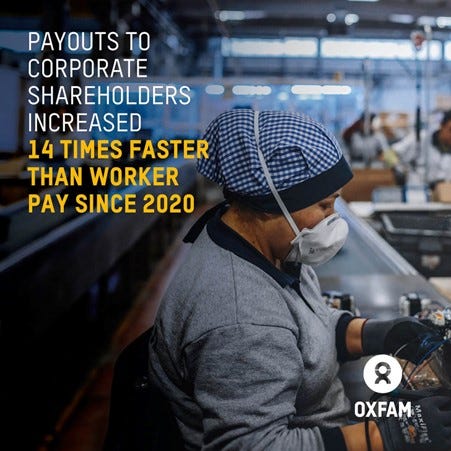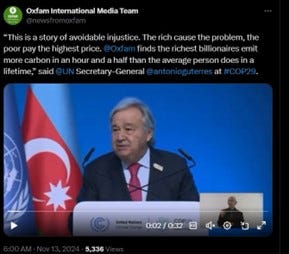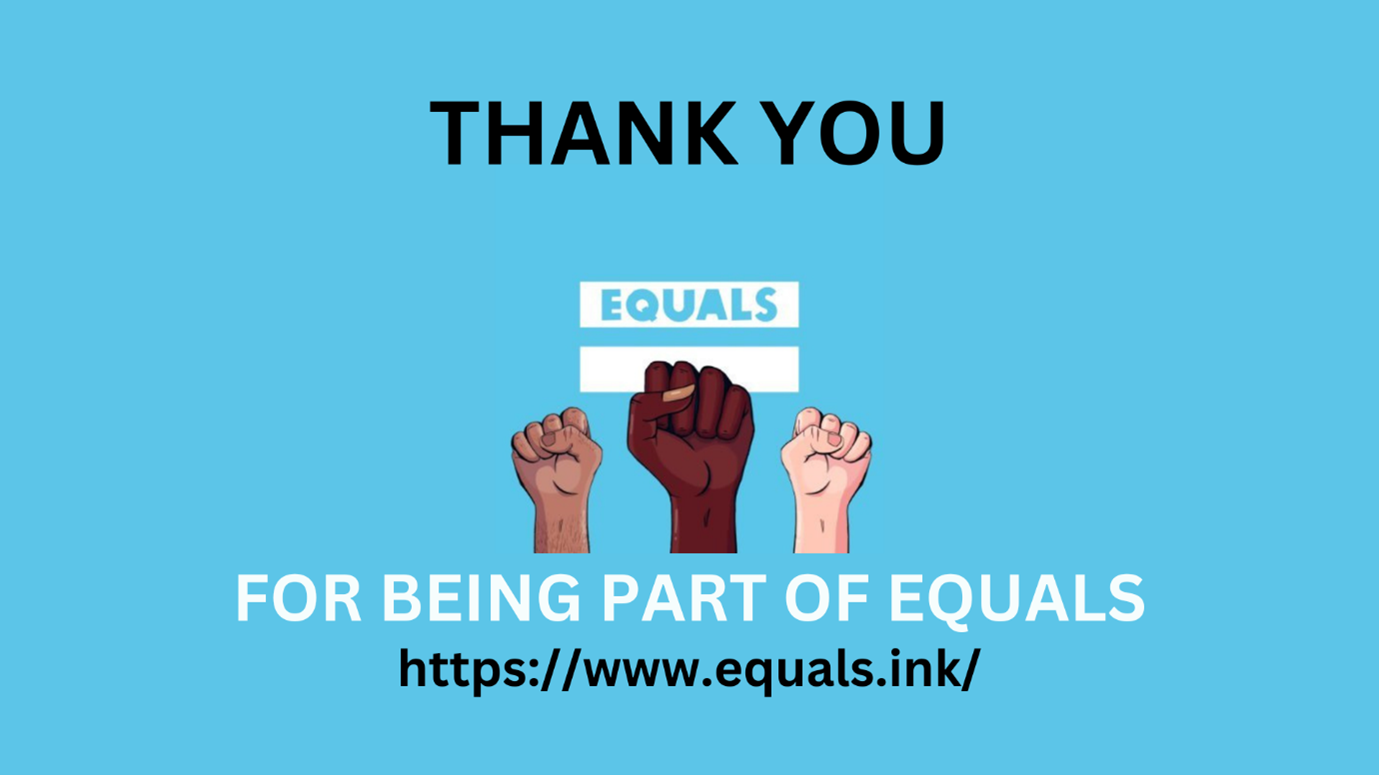Inequality 2024 Wrapped
The inequality stories that made headlines this year and our predictions for 2025.
The team behind Equals has been reflecting on some of the biggest successes and disappointments in the fight against inequality in 2024. We’ve also stuck our neck out and made some predictions for the year ahead.
The stats that went viral
The world’s first trillionaire? Our annual report on the state of global inequality was a brutal dissection of how corporate and billionaire power is dividing the world. We headlined with the stat “wealth of five richest men doubles since 2020 as five billion people made poorer,” but the number that went viral was our forecast of the first trillionaire in a decade.
Rewarding wealth, not work. International Workers’ Day is meant to celebrate the working class, but this May it was shareholders who were celebrating. Our research found that dividend payments to shareholder grew on average 14 times faster than worker pay in 31 countries. With the richest 1% owning 43% of all global financial assets, the continued dominance of capital over labor has dire consequences for inequality. The canary in the coal mine of inequality is singing its last song.
LAC of action? Oxfam’s investigation into inequality in Latin America and the Caribbean (LAC), the most unequal region in the world by wealth, is shocking. Someone earning a minimum wage would have to work for 90 years to earn what a LAC billionaire makes in a single day. The report lifts the lid on the region’s broken tax system and cuts to inequality busting social spending.
Uncommitted to reducing inequality. We ranked 164 governments on their inequality policies and found that since 2022, 84% of countries worldwide have reduced their spending on education, health and/or social protection. With similar trends on tax, labor right and wages, the clear conclusion is that rising inequality is a policy decision.
Dodgy accounting of climate finance. An audit of the World Bank’s climate finance portfolio found that up to $41 billion in World Bank climate finance, is unaccounted for, with no clear public record showing where this money went or how it was used. With examples of other forms of climate finance being used to fund things like ice cream shops and coal plants, there’s a huge risk that lack of transparency will undermine trust in global climate finance efforts.
Carbon inequality kills. Our annual climate and inequality report found that billionaires emit more carbon pollution in 90 minutes than the average person does in a lifetime and the details the tragic consequences of 1%’s emissions on economic growth, crop loss and heat-related deaths.
We’re not done for the year. The mince pies will have to wait as we put the finishing touches on our next Davos inequality report that launches mid-January. The report details how the super-rich are takers, not makers and examines how historic and modern-day colonialism drives extreme wealth inequality.
Inequality Ws
Step closer to a global tax on the super-rich. November’s G20 summit marked an historic victory in the fight to reduce extreme inequality and increase taxes on the richest individuals. Leaders meeting in Rio de Janeiro, Brazil, agreed to “engage cooperatively to ensure that ultra-high-net-worth individuals are effectively taxed.”
Climate equality goes mainstream. In his opening remarks at the summit, UN Secretary-General António Guterres – who quoted stats from Oxfam’s latest climate inequality research - made it clear that “the rich cause the problem, the poor pay the highest price”.
World Bank reports back on its new inequality goal. Behind the scenes, we worked hard to convince the World Bank to set a new goal to reduce inequality. They adopted an indicator to reduce the number of countries with high inequality and this summer reported that a third of countries have a Gini Index greater than 40.
Inequality Ls
Unchecked billionaire political influence. Former Equals podcast host Nabil Ahmed put it well – “Musk’s success at buying his way into the administration solidifies what we already knew to be true: oligarchy is taking hold of American democracy…There’s no telling how much more damage will be done with an oligarch like Musk standing by his side to enrich himself and his billionaire pals.”
COP out. The latest UNEP report shows the world is on track for a catastrophic 3.1°C warming and the world’s richest countries failed to agree to a finance deal at COP29 anything close to what is needed. What’s worse, the $300 billion deal reached is a mixture of loans and privatized investment which Equals host and climate guru Naf Dabi calls a “global Ponzi Scheme.”
Equals team 2025 predictions
We asked our podcast hosts, editors and writers to stare into their crystal balls.
Alex in the UK: Surely the US stock market bubble is about to burst? We know from bitter experience that the effect will be global and that the poorest will be hit hardest. The wealth of the super-rich, whose wealth is tied to markets, will plummet but the collateral damage will be immense. And just like the 2008 crisis, the richest will come out richer and more powerful than before.
Simon in Kenya: For a continent where democracy has not been a part of the usual menu, five ruling parties in Africa were ousted in elections this year. With elections in 12 African countries in 2025, I predict the trend of ruling parties losing power will continue although I’m pessimistic about real change coming anytime soon. The message is loud and clear. People are angry and they are fed up with empty promises, theft and misappropriation of public funds and abuse of power. They are saying enough is enough, it is time for change.
Naf in the UK: Updated climate pledges will be revealed as not enough to put the world on a safe path toward limiting warming to 1.5°C. Looming trade wars threaten to derail global progress and the global race for green technology risks leaving Global South countries behind. But it’s not all bleak. Civil society is mobilizing public action, demanding a better future for all. The question is: will the world finally listen?
Grazielle in Brazil: The economic outlook for Latin America and the Caribbean is for low growth in 2025 and continued slow reduction in inflation. Given this context, market demands for fiscal austerity have increased. Trump’s election and the impact of US policies in the region could further impose these austerity measures that cut funding for policies that reduce inequalities and guarantee social and environmental rights. 2025 is shaping up to be a decisive year for promoting alternatives: taxing the super-rich and excessive profits of large corporations, promoting a fair transition to a fair and sustainable development model, and co-responsibility in care work. How will LAC countries respond to this dispute? We hope in favour of the people and the planet, not of the market.
Max in the UK: Unless supposedly progressive parties actually begin talking about reining in elites, cutting corporate power, and taxing the rich to address the huge pressure on the daily lives of ordinary citizens, the right will continue to make in-roads into their support, and the working class will continue to abandon them, and vote for right-wing parties instead.
Anthony in Kenya: We’ll see our first trillionaire, a resurgence of populism and more right-wing parties winning elections, which will increase inequality. Governments will cut budgets on essential services to shore up their military spending. Trade wars could have massive consequences on the cost of daily commodities and government spending power.
Who do you think has read the tea leaves correctly? Leave your predictions in the comments below.
Don’t forget to listen to our latest podcast episode with Kate Pickett and Richard Wilkinson about how more equal societies are the key to everything that is good.






